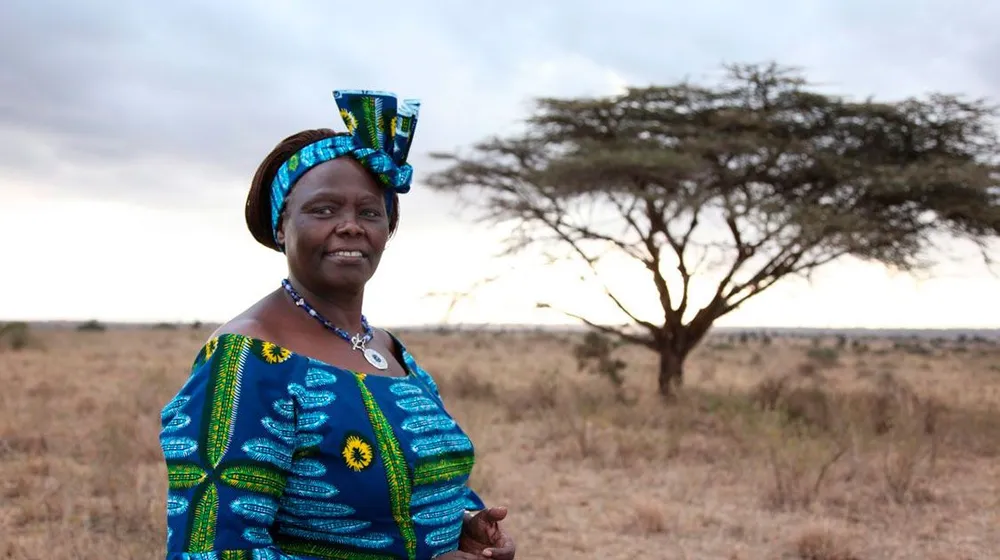Where Trees Take Root, So Does Freedom
The Story of Wangarĩ Maathai
Wangarĩ Maathai was born in 1940 in rural Kenya among the rolling green hills of Nyeri. She grew up intimately connected with nature, absorbing the wisdom of her Kikuyu heritage, which taught respect and gratitude for the living earth. It was this early bond with the land and the hardships she observed among women in her community that sowed the seeds for her future work in environmental conservation and women’s empowerment.
Maathai took a path few women in her time dared to venture. Her academic journey led her far beyond her village, first to the United States where she earned a Master’s degree in biological sciences, and then back to Kenya to complete her PhD in veterinary anatomy at the University of Nairobi in 1971, becoming the first woman in East and Central Africa to hold such a doctorate. She then broke further ground by becoming Kenya’s first female department chair and associate professor.


Wangarĩ Maathai linked environmental conservation with social justice, founding the Green Belt Movement to empower women through tree planting and to fight against the impact of deforestation. Her words remind us: “Until you dig a hole, you plant a tree, you water it, and make it survive, you haven’t done a thing. You’re just talking.” She opposed corruption and land grabbing, persistently advocating for Kenya’s democracy despite government repression. Her fighting spirit was unbreakable. When arrested by police during protest activities, she always returned to the protest session immediately after being set free.
She was the first African woman and the first environmentalist to receive the Nobel Peace Prize in 2004. The Nobel Committee praised her “holistic approach to sustainable development, encompassing democracy, human rights and, in particular, women’s rights.” This shows that Maathai’s vision was both environmental and recognized peace and equitable development as interrelated. Upon being informed of her Nobel Prize win, Wangari celebrated by planting a tree in her homeland, Nyeri.
After the fall of the dictatorial government, Maathai became a member of parliament in Kenya, achieving 98% of the votes. She is known worldwide for delivering speeches at the United Nations and participating in forums on climate change and peace. She founded the Wangarĩ Maathai Institute to ensure that her vision lives on through research and education.

Wangarĩ’s pragmatic humor showed up when her ex-husband asked her to drop his name, Mathai, after the divorce. She did so by simply adding another “a” to the name, and from then on became famous under the family name Maathai.
Professor Maathai died on 25 September 2011 at the age of 71 after a battle with ovarian cancer; her legacy lives on in millions of trees planted and the strong voices of women standing up for what is right. She showed the world that caring for the earth goes hand in hand with caring for each other. Her friend Salma Hasan Ali reports one of Wangarĩ’s favorite stories: When a fire breaks out in a huge forest, all the animals flee except the hummingbird. The little bird flies back and forth, its tiny beak filled with water. The other animals are petrified. When they ask what the hummingbird can possibly do with its small beak, the little bird answers, “I am doing the best I can.”
Let us honor Wangarĩ Maathai by embodying the spirit of the hummingbird, doing our best to care for the earth and each other.
By AnniM
Sources:
- The Green Belt Movement, and the story of Wangari Maathai. YES! Magazine. (2005, March 26). https://www.yesmagazine.org/issue/media/2005/03/26/the-green-belt-movement-the-story-of-wangari-maathai
- Ali, S. H. (2024, September 9). The lessons I learned from Wangari Maathai. Salma Hasan Ali. https://www.salmahasanali.com/blog/the-lessons-i-learned-from-wangari-maathai
- Celebrating Wangari Maathai: An Icon of Environmental Advocacy … (2024). https://www.straughanenvironmental.com/news-insights/celebrating-wangari-maathai-an-icon-of-environmental-advocacy-and-womens-empowerment/
- The story | About Wangari Maathai. (2020). https://wangarimaathai.org/wangaris-story/
- Wangari Maathai – Biographical – NobelPrize.org. (2018). https://www.nobelprize.org/prizes/peace/2004/maathai/biographical/
